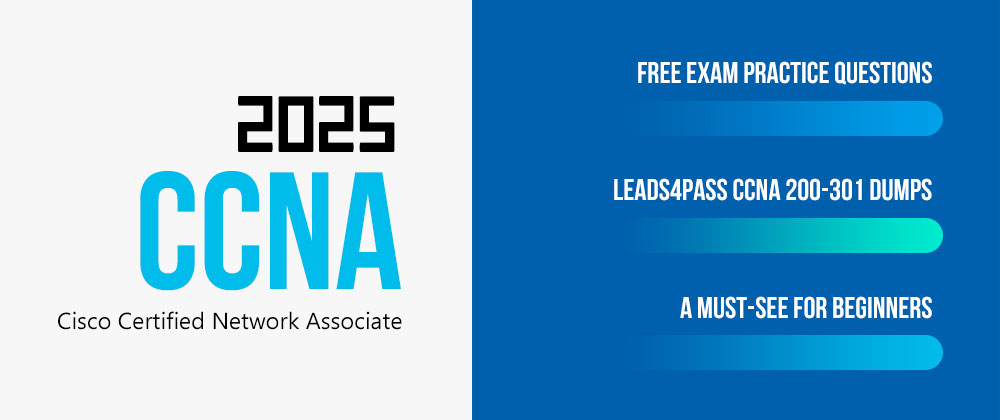
Leads4Pass CCNA 200-301 dumps are the latest update in 2025, including 1605 exam questions and answers. According to the actual requirements of CCNA certification, single & multiple choice, drag drop, simulation labs exam question types are formulated to help candidates feel the actual scenario exam.
View specific points:
| Single & multiple choice | 1386Q&As |
| Drag drop | 181Q&As |
| Simulation labs | 38Q&As |
| Updated | Mar 19, 2025 |
CCNA 200-301 certification is a certification exam that most people have heard of. It is the entry-level exam for Cisco certification and mainly reflects the basic knowledge and practical ability of the network.
Welcome to use PL-200 dumps with PDF and VCE: https://www.leads4pass.com/200-301.html to help you pass the CCNA certification exam successfully. Next, I will continue to share some of the latest 2025 exam questions and answers for free!
2025 CCNA 200-301 dumps practice questions shared online
| Number of exam questions | Latest Updated | New update | A must-see for beginners |
| 15 | 200-301 dumps (Q1-Q15) | Q16-Q30 | Click to view |
Question 16:
Refer to the exhibit. Which two statements about the network environment of router R1 must be true? (Choose two.)
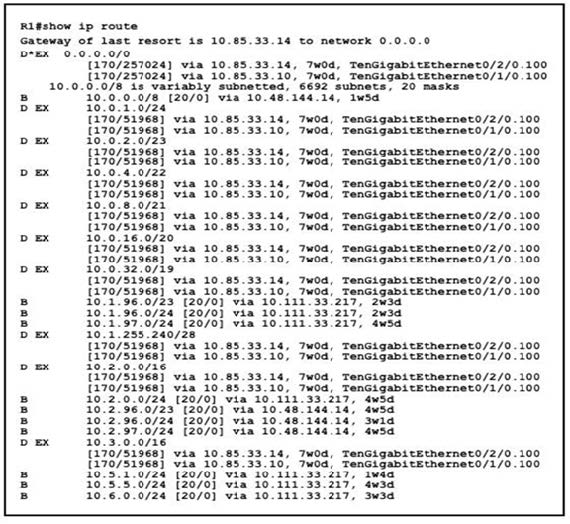
A. There are 20 different network masks within the 10.0.0.0/8 network.
B. A static default route to 10.85.33.14 was defined
C. Ten routes are equally load-balanced between Te0/1/0.100 and Te0/2/0.100
D. The 10.0.0.0/8 network was learned via external EIGRP
E. The EIGRP administrative distance was manually changed from 90 to 170
Correct Answer: AC
Question 17:
Which command can you enter to determine the addresses that have been assigned on a DHCP Server?
A. Show ip DHCP database.
B. Show ip DHCP pool.
C. Show ip DHCP binding.
D. Show ip DHCP server statistic.
Correct Answer: C
Question 18:
Refer to the exhibit.

An engineer executed the script and added commands that were not necessary for SSH and now must remove the commands.
A. metric
B. cost
C. longest prefix
D. administrative distance
Correct Answer: D
Question 19:
How do TCP and UDP differ in the way they provide reliability for delivery of packets?
A. TCP does not guarantee delivery or error checking to ensure that there is no corruption of data, UDP provides message acknowledgement and retransmits data if lost.
B. TCP provides flow control to avoid overwhelming a receiver by sending too many packets at once, UDP sends packets to the receiver in a continuous stream without checking for sequencing
C. TCP is a connectionless protocol that does not provide reliable delivery of data; UDP is a connection-oriented protocol that uses sequencing to provide reliable delivery.
D. TCP uses windowing to deliver packets reliably; UDP provides reliable message transfer between hosts by establishing a three-way handshake.
Correct Answer: B
Ref: CCNA 200-301 Official Cert Guide, Volume 2
“Chapter 1. Introduction to TCP/IP Transport and Applications
…
Flow Control Using Windowing
TCP implements flow control by using a window concept that is applied to the amount of data that can be outstanding and awaiting acknowledgment at any one point in time.
…
User Datagram Protocol
UDP provides a service for applications to exchange messages. Unlike TCP, UDP is connectionless and provides no reliability, no windowing, no reordering of the received data, and no segmentation of large chunks of data into the right size
for transmission.
…”
Question 20:
Refer to the exhibit. An engineer assumes a configuration task from a peer Router A must establish an OSPF neighbor relationship with neighbor 172 1 1 1 The output displays the status of the adjacency after 2 hours. What is the next step in the configuration process for the routers to establish an adjacency?

A. Configure router A to use the same MTU size as router B
B. Set the router B OSPF ID to a nonhost address.
C. Configure a point-to-point link between router A and router B
D. Set the router B OSPF ID to the same value as its IP address
Correct Answer: A
Question 21:
Under the CRUD model, which two HTTP methods support the UPDATE operation? (Choose two.)
A. PATCH
B. DELETE
C. GET
D. POST
E. PUT
Correct Answer: AE
Question 22:
What criteria is used first during me root port selection process?
A. local port ID
B. lowest path cost to the root bridge
C. lowest neighbor\’s bridge ID
D. lowest neighbor\’s port ID
Correct Answer: B
Question 23:
Refer to the exhibit. An administrator configures four switches for local authentication using passwords that are stored as a cryptographic hash. The four switches must also support SSH access for administrators to manage the network infrastructure. Which switch is configured correctly to meet these requirements?
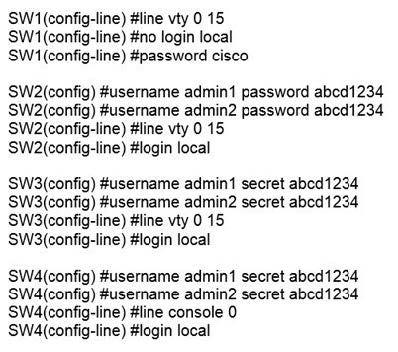
A. SW1
B. SW2
C. SW3
D. SW4
Correct Answer: C
Question 24:
If all OSPF routers in a single area are configured with the same priority value, what value does a router use for the OSPF router ID in the absence of a loopback interface?
A. the IP address of the first Fast Ethernet interface
B. the IP address of the console management interface
C. the highest IP address among its active interfaces
D. the lowest IP address among its active interfaces
E. the priority value until a loopback interface is configured
Correct Answer: C
Question 25:
What is a characteristic of private IPv4 addressing?
A. simplifies the addressing in the network
B. complies with PCI regulations
C. reduces the forwarding table on network routers
D. is used on hosts that communicate only with other internal hosts
Correct Answer: D
Question 26:
Why does a switch flood a frame to all ports?
A. The frame has zero destination MAC addresses.
B. The source MAC address of the frame is unknown
C. The source and destination MAC addresses of the frame are the same
D. The destination MAC address of the frame is unknown.
Correct Answer: D
Question 27:
What is the function of a hub-and-spoke WAN topology?
A. allows access restrictions to be implemented between subscriber sites.
B. provides direct connections between subscribers
C. supports Layer 2 VPNs
D. supports application optimization
Correct Answer: B
Question 28:
Refer to the exhibit.
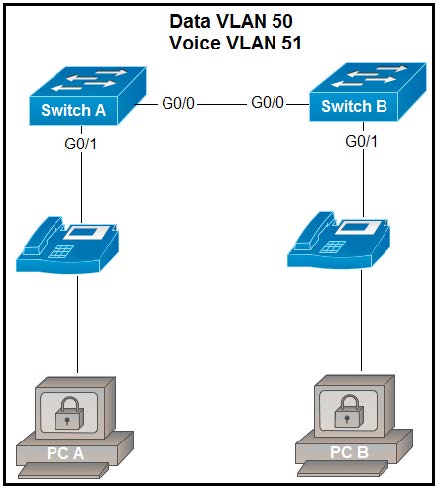
Switch A is newly configured. All VLANs are present in the VLAN database. The IP phone and PC A on Gi0/1 must be configured for the appropriate VLANs to establish connectivity between the PCs.
Which command set fulfills the requirement?
A. SwitchA(config-if)#switchport mode access SwitchA(config-if)#switchport access vian 50 SwitchA(config-if)#switchport voice vlan 51
B. SwitchA(config-if)#switchport mode access SwitchA(config-if)#switchport access vlan 50 SwitchA(config-if)#switchport voice vlan untagged
C. SwitchA(config-if)#switchport mode trunk SwitchA(config-if)#switchport trunk allowed vlan add 50, 51 SwitchA(config-if)#switchport voice vlan dot1p
D. SwitchA(config-if)#switchport mode trunk SwitchA(config-if)#switchport trunk allowed vlan 50, 51 SwitchA(config-if)#mls qos trust cos
Correct Answer: A
https://networklessons.com/cisco/ccna-routing-switching-icnd1-100-105/voice-vla
First, we have to create the two VLANs:
SW1(config)#vlan 100 SW1(config-vlan)#name COMPUTER SW1(config-vlan)#exit
SW1(config)#vlan 101 SW1(config-vlan)#name VOIP SW1(config-vlan)#exit Now we can configure the interface:
SW1(config)#interface GigabitEthernet 0/1 SW1(config-if)#switchport mode access SW1(config-if)#switchport access vlan 100 SW1(config-if)#switchport voice vlan 101 SW1(config-if)#exit We configure the interface in access mode and use VLAN 100 for the computer. The switchport voice vlan command tells the switch to use VLAN 101 as the voice VLAN.
Question 29:
Refer to the exhibit.
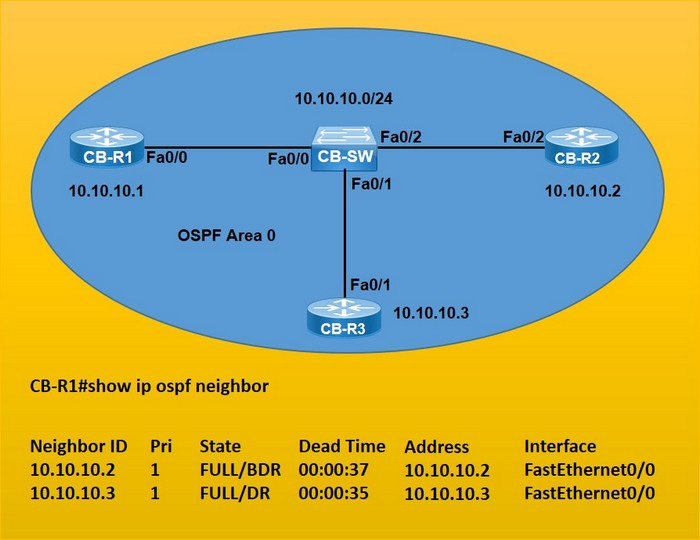
CB-R1 has taken the DROTHER role in the OSPF DR/BDR election process.
Which configuration must an engineer implement so that CB-R1 is elected as the DR?
A. CB-R1(config)#interface FastEthernet 0/0 CB-R1(config-if)#ip ospf priority 1 CB-R1#clear ip ospf process
B. CB-R1(config)#interface FastEthernet 0/0 CB-R1(config-if)#ip ospf priority 200 CB-R1#clear ip ospf process
C. CB-R3(config)#interface FastEthernet 0/1 CB-R3(config-if)#ip ospf priority 200 CB-R3#clear ip ospf process
D. CB-R2(config)#interface FastEthernet 0/2 CB-R2(config-if)#ip ospf priority 1 CB-R2#clear ip ospf process
Correct Answer: B
Question 30:
DRAG DROP
Drag and drop the application protocols from the left onto the transport protocols that is uses on the right.
Select and Place:
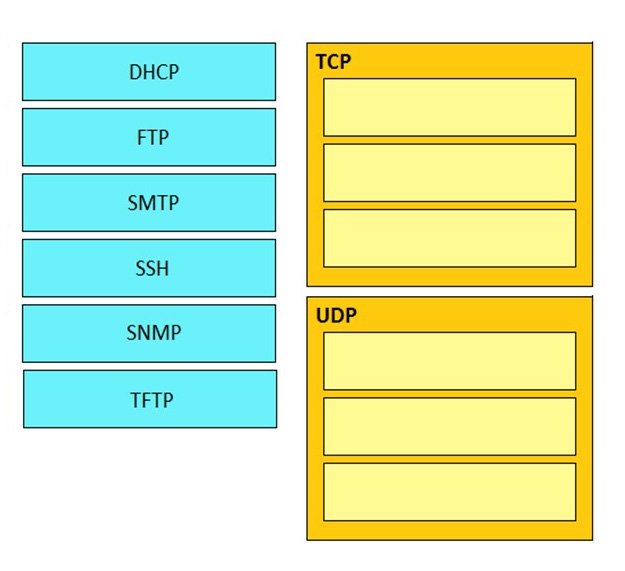
Correct Answer:
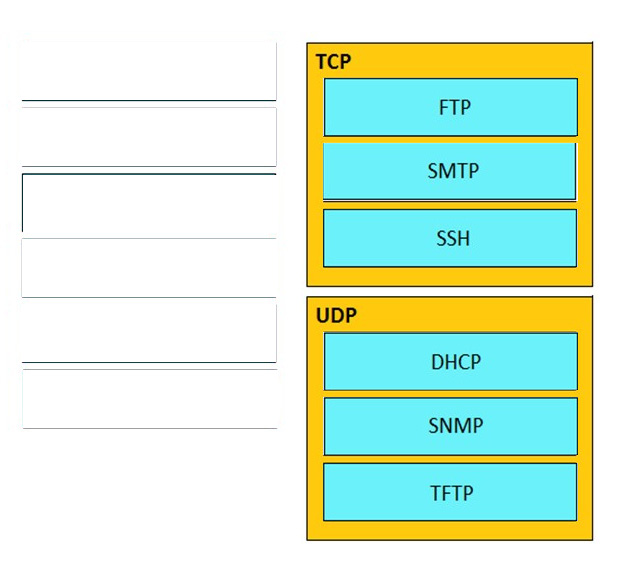
…
Practice the complete CCNA 200-301 dumps in 2025: https://www.leads4pass.com/200-301.html, matching the complete real exam environment, assisting you to solve the key points and difficulties of the exam, and helping you to actually pass the CCNA certification exam.
This is the end of the article! However, there are some details that need to be told to inexperienced candidates. The following content is shared for rookies.
A must-see for beginners
CCNA Exam Prep Overview
Duration:120 minutes (non-English speakers may get an extra 30 minutes).
Number of Questions: Approximately 100-120 questions (varies randomly).
Question Types:Single-choice, multiple-choice, drag-and-drop, simulation.
Total Score:1000 points, passing score around 825.
Exam Content:Covers network fundamentals, routing and switching, IP services, security fundamentals, automation and programmability.
Preparation Tips and Key Techniques
Combine Theory and Practice: Use Cisco Packet Tracer or GNS3 for simulations, especially VLAN, OSPF, NAT, and ACL configurations.
Practice with Leads4Pass CCNA 200-301 dumps: CCNA dumps cover single & multiple choice, drag drop, simulation labs, Drag-and-drop questions often test protocol layers or configuration step ordering.
Time Management: Exam time is sufficient; prioritize multiple-choice (about 1 min/question) and save time for simulations.
Key Difficulties:Subnetting calculations (quickly determine IP ranges and host counts). OSPF neighbor establishment and troubleshooting. ACL direction (inbound/outbound) and matching order.
Common Mistakes
IP Subnetting:Miscalculating usable hosts or broadcast addresses.
ACL Configuration:Forgetting to apply to an interface (e.g., interface g0/0, ip access-group 100 in).
OSPF Areas:Incorrect Area 0 configuration preventing neighbor establishment.
NAT:Incorrect inside/outside interface configuration (e.g., mixing up ip nat inside and ip nat outside).